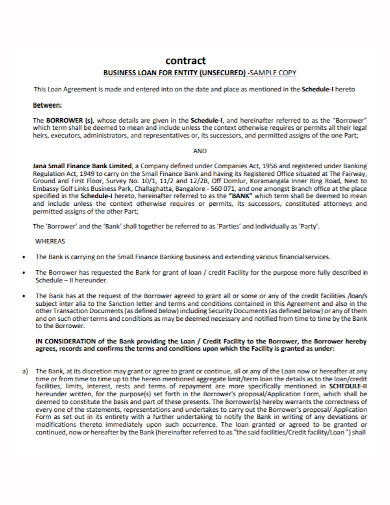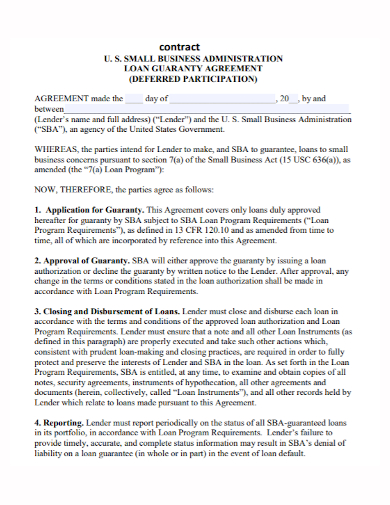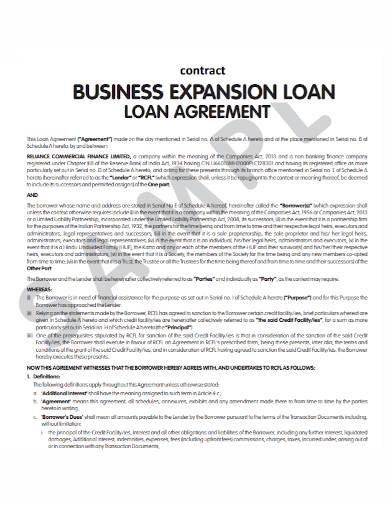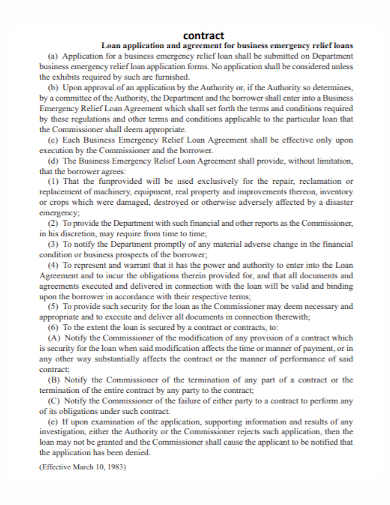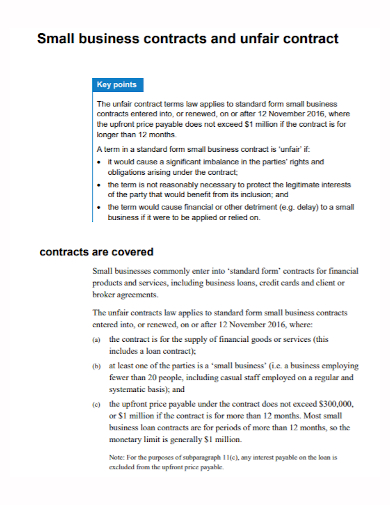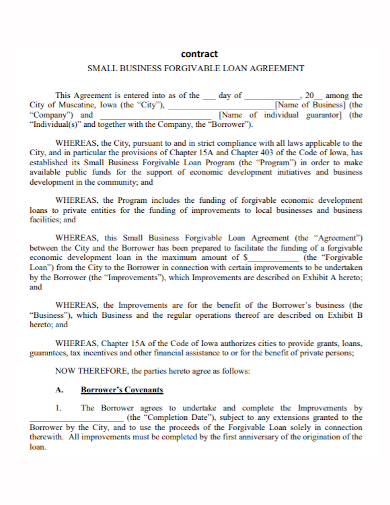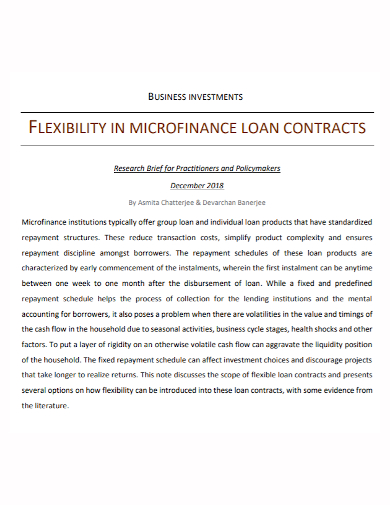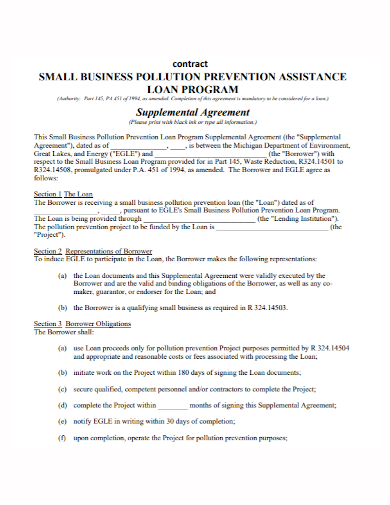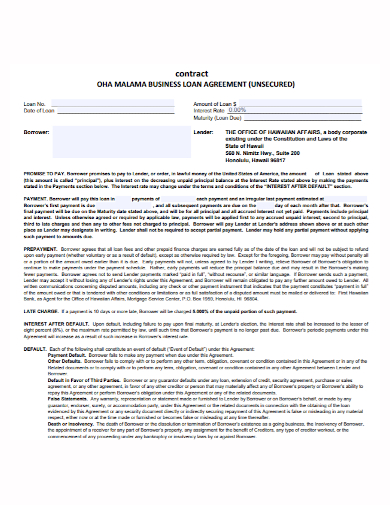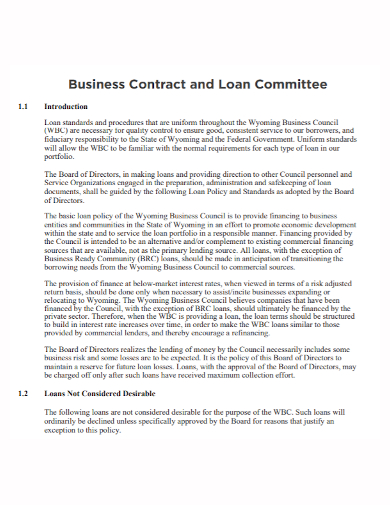A business loan contract’s purpose is to prove that you’re borrowing money from a lender, whether it’s a bank, a family member, or an unconventional platform. Don’t toss a loan agreement into a drawer and forget about it. That contract spells out the loan’s terms and conditions, and it will serve as a guide as you pay off your debt. It’s time to sign a loan contract after you’ve looked for a small business loan, gone through the underwriting procedure, and received an offer. However, you must first educate yourself on what you are signing. Institutions may organize information using different terms or formats, but the components of all loan agreements are essentially the same.
10+ Business Loan Contract Samples
What is a business loan contract? A business loan sometimes referred to as a commercial loan, is any loan that is used for business reasons. A business loan agreement is a document that spells forth the terms of the loan. Apart from the intended use of cash, a business loan is similar to a personal loan. The link between a lender, who issues money, and a borrower, who accepts the money and agrees to repay it plus interest, is central to the notion. The loan agreement, whether the company or personal, specifies the amount of money borrowed when it will be repaid, and the cost of borrowing money.
1. Business Loan Contract Template
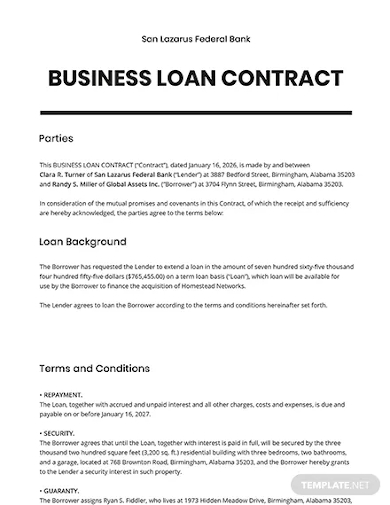
2. Business Loan Entity Contract
3. Small Business Loan Contract
4. Business Expansion Loan Contract
5. Business Emergency Loan Contract
6. Sample Business Loan Contract
7. Business Forgivable Loan Contract
8. Business Investment Loan Contract
9. Business Loan Program Contract
10. Business Loan Agreement Contract
11. Business Loan Committee Contract
Sections of a Business Loan Contract
- Effective date – The money is disbursed to the borrower on this day. The effective date is usually the day on which you sign the loan agreement.
- Parties, relationship, and the loan amount – The loan agreement’s two parties are introduced at the outset. Their relationship should be defined and they should be identified in some way, such as with an address. If the business has a co-signer who is assisting with the down payment or collateral, this individual has described in the section about the parties and their relationship. This part will also include information on the loan amount.
- Promissory note or mortgage – A promissory note or a mortgage may be included in the lending arrangement. A promissory note is essentially a promise to pay, and a mortgage is a type of promissory note that covers a specific property (land and building). The promissory note could be secured by a business asset or unsecured.
- Collateral – The collateral will be stated in the loan agreement if the loan is secured. A loan’s collateral is a property or other business asset that serves as security in the event that the borrower defaults on the loan. In the event of a mortgage, the collateral could be land and buildings, vehicles, or equipment. The loan agreement specifies the collateral in detail.
- Terms and conditions – The most crucial aspect of the loan is this. The terms include the installment agreement because most business loans are installment loans with recurring installments.
- Penalties for non-payment – What happens if payments aren’t made on time is also included in the terms. There is normally a grace period each month, which is a set number of days after the due date during which the loan can be paid without penalty. The agreement specifies penalties if the payment is not paid within the grace period.
- Defaults and acceleration clause – Both parties have made commitments, and if one of them is not kept, the agreement will be in default. The loan agreement specifies any fines and penalties that may be imposed if the borrower defaults on the loan (does not satisfy the terms and conditions). As a penalty, an acceleration clause might be utilized. If the borrower fails to meet all of the agreement’s criteria, the loan may become instantly due and payable.
- Governing law – State regulations govern business loans, which vary from state to state. A clause in your loan agreement should clarify which state law rules the transaction.
- Representations of the borrower – As the borrower, you will be required to verify the accuracy of certain statements. These declarations could include your assurance that the company is legally able to do business in the state, that it is following tax rules, that it has no liens or lawsuits against it that could impair its capacity to repay the loan, and that the company’s financial records are true and correct. These are just a few examples; your loan may require more representations. This loan may require the signature of a member of your board of directors.
- Covenants – Both parties make promises in a covenant. Several covenants will be required by most lenders as part of the loan arrangement.
FAQs
Why should I use a loan contract?
Because it legally enforces the borrower’s agreement to repay the loan in monthly installments or lump sums, using a Loan Contract protects you as a lender. A loan contract may also be valuable to a borrower because it spells out the terms of the loan for their records and makes it easier to keep track of payments.
Should I charge interest in the loan contract?
Interest is a technique for a lender to charge money on a loan in order to compensate for the transaction’s risk. If the borrower fails to make a timely payment, you may decide to start collecting interest or increase the interest rate. The extra interest compensates you for the borrower’s inability to pay as agreed and the inconvenience of having to enforce the Loan Agreement.
If you want to see more samples and formats, check out some business loan agreement samples and templates provided in the article for your reference.
Related Posts
Sample Excuse Letter for School
Feature Writing Samples
FREE 10+ Security Guard Contract Samples in PDF | MS Word
FREE 10+ Option to Purchase Agreement Samples in MS Word | Apple Pages | PDF
FREE 26+ Curriculum Form Samples in MS Word | PDF
FREE 20+ Cleaning Service Proposal Samples in PDF | MS Word
FREE 29+ Sample Loan Application Form Templates in MS Word | PDF
FREE 10+ Event Venue Contract Samples in PDF | MS Word | Pages | Google Docs
FREE 10+ SBAR Samples in PDF | DOC
FREE 12+ Music Band Contract Templates in PDF | MS Word
FREE 10+ HVAC Maintenance Contract Samples in PDF | MS Word
FREE 10+ Social Media Marketing Contract Samples in MS Word | PDF
FREE 10+ Wholesale Assignment Contract Samples in PDF
FREE 18+ Financial Proposal Samples in PDF | MS Word | Google Docs | Pages
FREE 10+ Feasibility Study Samples in PDF

